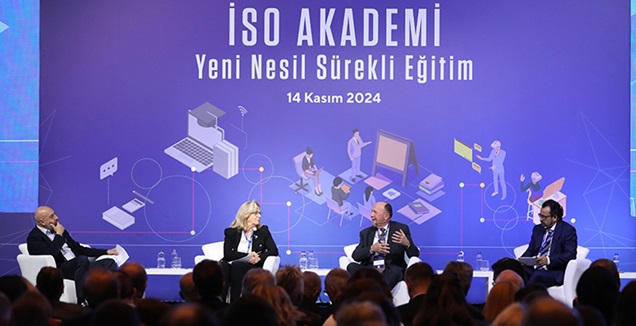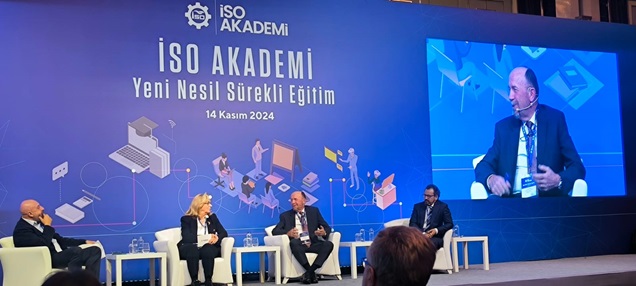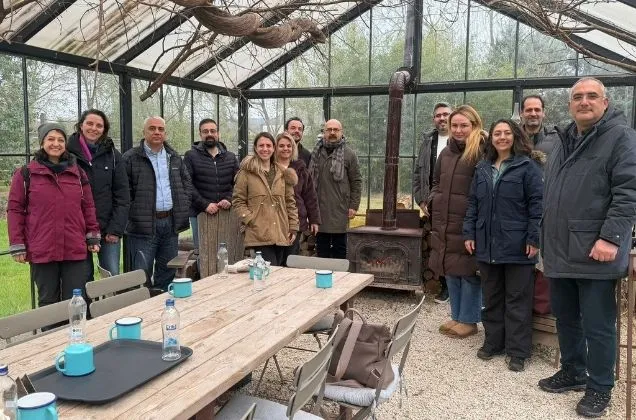21/11/2024
The launch ceremony of the ISO (Istanbul Chamber of Industry) Academy was held on November 14. One of the most interesting parts of the ceremony was the “Education Strategies for the Future” panel moderated by Assoc. Prof. Dr. Ecmel Ayral. Sabancı University Secretary General Ali Çalışkan, also participated in the panel.

The launch ceremony of the ISO (Istanbul Chamber of Industry) Academy was held with the participation of important figures from the education and industry worlds, hosted by Erdal Bahçıvan, Chair of the ISO Board. Distinguished guests such as Davut Gül, the Governor of Istanbul, Mahmut Özer, the Chair of the Turkish Grand National Assembly’s National Education, Culture, Youth and Sports Commission, and Prof. Dr. Selçuk Şirin, New York University Faculty Member, gave speeches at the ceremony.
One of the most interesting parts of the ceremony was the “Education Strategies for the Future” panel moderated by Assoc. Prof. Dr. Ecmel Ayral. Sabancı University Secretary General Ali Çalışkan, LC Waikiki Corporate Academy Director Gülperi Savcı Tandar, and Yıldız Holding Human Resources President Bahattin Aydın took part in the panel.
Opening Speeches from ISO and Public Representatives
ISO Board Chair Erdal Bahçıvan defined the mission of ISO Academy as supporting Turkey's qualified workforce and increasing the competitiveness of companies. Bahçıvan emphasized the importance of investing in competent individuals, especially in technology and value-added production areas. He also stated that the academy, which was established in 2019, has reached a wide audience with the various training programs it has carried out to date.
Istanbul Governor Davut Gül introduced the education support projects of the Istanbul Children's Foundation for disadvantaged children. He stated that projects such as "Homework Houses" provide a safe study environment for children and offer scholarship opportunities to highly successful students.
The Turkish Grand National Assembly’s National Education, Culture, Youth and Sports Commission Chair Mahmut Özer drew attention to the historical role of ISO in Turkey's development and emphasized the impact of education on individual and social progress. Özer stated that technologies such as artificial intelligence can transform education and drew attention to the importance of lifelong learning programs.
Sabancı University Secretary General Ali Çalışkan's Contributions to the ISO Academy Panel
Following the opening speeches, a panel entitled 'Education Strategies of the Future', moderated by Ecmel Ayral, was held. The panel, which began with Ecmel Ayral's opening message, featured participants discussing future education strategies in terms of academia, industry, and institutional approaches to education, and sharing sample experiences and plans on how to nurture and contribute to the development of human resources in industries.
In his opening message, Ayral emphasized the importance of learning and development within the ever-changing dynamics of the business world, and stated that traditional education models were being replaced by a more flexible and continuous learning approach. He also stated that the business world needed a new organizational structure with the increase in freelance work styles. While Gülperi Tandar and Bahattin Aydın addressed institutional responses to the rapidly changing business world, Ali Çalışkan focused on broader trends and the role of universities in preparing for the future.
Tandar emphasized the importance of continuous education for the sustainability of corporate success and shared the example of LC Waikiki's "education mobilization" during the pandemic. She stated that companies need to adapt quickly and develop a culture of continuous learning. Aydın, with a similar perspective, expressed the importance of investing in employee education, especially in the field of digital skills. He argued that a mindset change from "teaching to learning" is required for organizations to be ready for the future and said that companies should adopt a culture of continuous growth.

Sabancı University Secretary General Ali Çalışkan, who provided a perspective on academic approaches in the panel, emphasized that universities should also transform in order to keep up with the pace of change in the globalizing world.
Responding to the question, "Why is learning necessary in the professional field and in the business world?" by giving the example of the World Economic Forum's report that predicts significant transformations in the business world in the coming years, Çalışkan said, "The World Economic Forum's report on the future of jobs predicts that 23% of current jobs will change, 83 million jobs will disappear, and 69 million new jobs will emerge. This means a net loss of 14 million jobs. Considering the point that artificial intelligence and machine learning have reached, it is clear that this change will accelerate even more. In such an environment, university-industry collaboration is of vital importance." He stated that this changing environment also necessitates the transformation of educational paradigms and that students must be equipped with the necessary skills and knowledge to be successful in the future.
Çalışkan explained how Sabancı University responds to this challenge, stating that the University offers students the flexibility and choice to shape their education according to their individual needs with its interdisciplinary education model. He explained that this model prepares students for various career fields by providing them with adaptability. He also acknowledged the difficulties of bringing academia and industry together, but expressed optimism about the potential for collaboration, especially in the development and delivery of online education programs, and emphasized that Sabancı University's non-thesis Professional Master's programs are programs created directly for industry needs, are a new opportunity for our young people who gain certain experience in the business world after graduation, and are an important initiative in terms of increasing the depth of our people and ensuring continuity of learning. Ali Çalışkan also mentioned that the minor programs offered so that students can gain knowledge in areas not offered in undergraduate diploma programs are also important in terms of diversifying the workforce in the industry and providing different talents to the industries. He touched on the Sabancı University Battery Science and Engineering Minor Program, which has recently started to provide education within this scope.
In terms of industry and education collaboration, Çalışkan stated that certification programs are carried out for almost the majority of the industry in Turkey today with Sabancı University EDU, and he also underlined EDU’s ability to make customized programs for companies.
Çalışkan's views on the role of universities in a rapidly changing world offered a valuable perspective parallel to Tandar and Aydın's institutional perspectives. Çalışkan emphasized the importance of cooperation between academia and industry in order to close the gap between education and the demands of the modern business world. Following the panel, the event continued with a presentation by Prof. Dr. Selçuk Şirin.
Prof. Selçuk Şirin Calls for Comprehensive Education Reform
New York University Faculty Member Prof. Dr. Selçuk Şirin said that education is critical for individual and social progress. He emphasized that reforms are needed in Turkey, especially in the areas of early childhood education and lifelong learning. Şirin stated that social, cultural, and creative elements in education should be addressed together with technical skills. Şirin, who warned about brain drain and preparing young people for the future, stated that Turkey's problems related to education must be resolved urgently.
The event ended with an interactive session where Prof. Şirin answered questions from participants.




